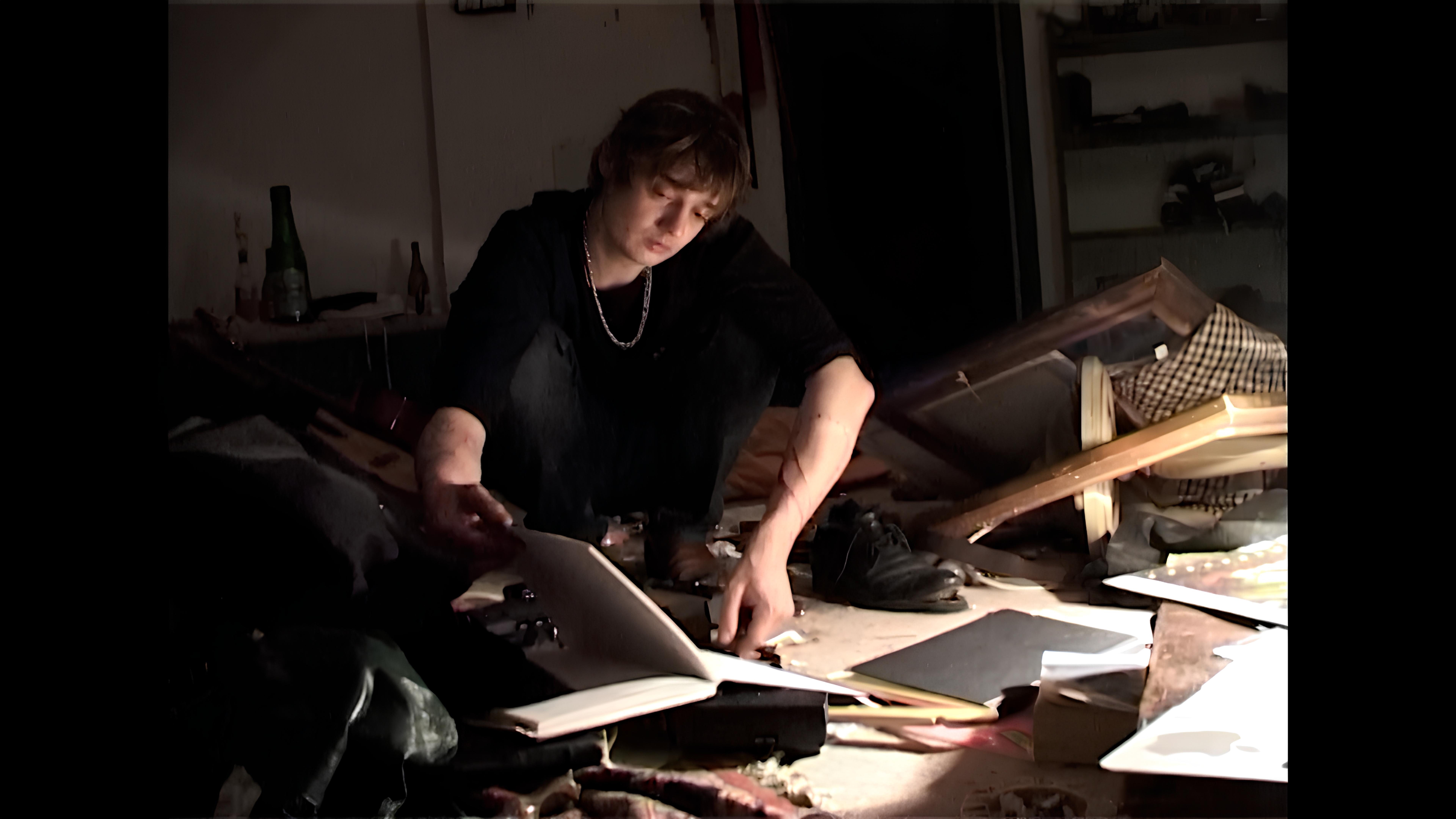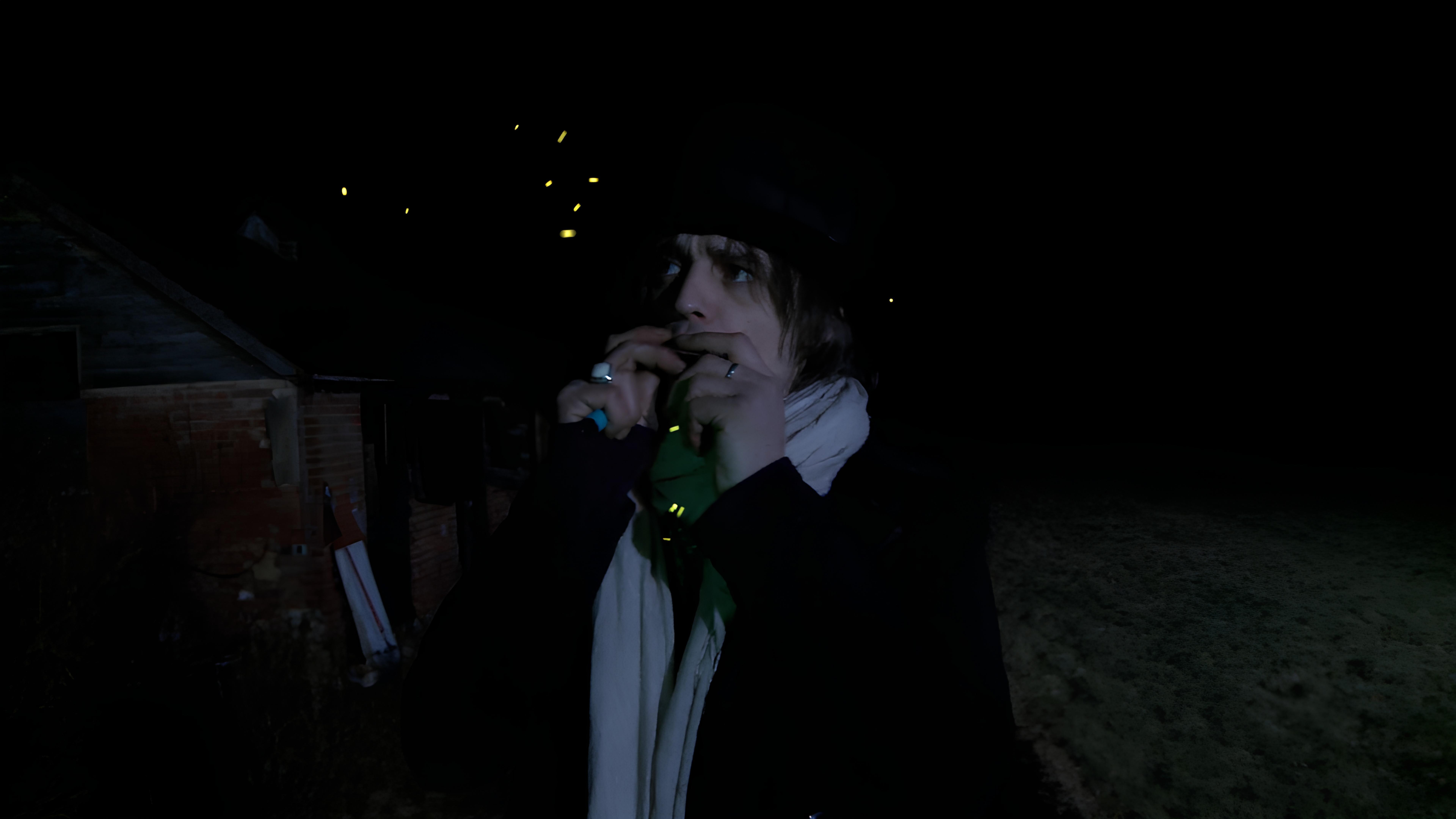Peter Doherty: Stranger In My Own Skin review – close-up on chaos | reviews, news & interviews
Peter Doherty: Stranger In My Own Skin review – close-up on chaos
Peter Doherty: Stranger In My Own Skin review – close-up on chaos
Startling, incurious access to a dissolute rock life

Pete Doherty’s notorious tabloid image as Kate Moss’s junkie rock star boyfriend blessedly faded following that relationship’s end, stopping short of Amy Winehouse territory. Katia deVidas’s documentary focuses on that addiction through his preferred self-image as a latter-day Rimbaud, a punk poet more suited to his current French home. The result is remarkably unvarnished, but narrowly framed.
Devidas began by filming a Babyshambles gig in Paris, then became periodically embedded in Doherty’s life over 10 years, convinced he was a true artist, even as smack and crack defined his life. The film’s perspective is usefully French, sympathetic to destructive lives producing fevered art, where the Anglophone fashion is censorious. The Libertines, who Doherty co-led with Carl Barât, were the last gasp of old-fashioned rock stardom, and for deVidas he embodies the living “spirit of 19th century Romanticism”. She had bought into her subject’s myth, even before she became his wife in 2021.
 The Libertines phenomenon, 20 years gone now, is mostly outside deVidas’s remit and experience. It was built on total intimacy with fans and the wistful, rackety beauty of Doherty and Barât’s Albion, an England both higher and lower than the real thing, peopled by the pungent ghosts of Tony Hancock and Joe Strummer and splicing punk rock with Brighton Rock. Doherty explains it here with undimmed passion. “Complete faith is what we lived inside,” he says, talking of songs such as “Boys in the Band”. “It can still happen, people do still believe. So we put extra hours into building the church.” This resulted, he argues, in “a need for chaos and frenzy so you can be fully part of everything,” illustrated here by his heedless dive into a roiling crowd. His downfall partook of more suspect romance. “'Kubla Khan'…Hunter Thompson…wrap of heroin…” Doherty burgling Barat’s flat symbolised their dream’s quick corruption. His subsequent band Babyshambles, defined solely by his wispy voice, trace-poetry and drug damage, embodied the comedown.
The Libertines phenomenon, 20 years gone now, is mostly outside deVidas’s remit and experience. It was built on total intimacy with fans and the wistful, rackety beauty of Doherty and Barât’s Albion, an England both higher and lower than the real thing, peopled by the pungent ghosts of Tony Hancock and Joe Strummer and splicing punk rock with Brighton Rock. Doherty explains it here with undimmed passion. “Complete faith is what we lived inside,” he says, talking of songs such as “Boys in the Band”. “It can still happen, people do still believe. So we put extra hours into building the church.” This resulted, he argues, in “a need for chaos and frenzy so you can be fully part of everything,” illustrated here by his heedless dive into a roiling crowd. His downfall partook of more suspect romance. “'Kubla Khan'…Hunter Thompson…wrap of heroin…” Doherty burgling Barat’s flat symbolised their dream’s quick corruption. His subsequent band Babyshambles, defined solely by his wispy voice, trace-poetry and drug damage, embodied the comedown.
Doherty is shown shooting up, not so much the film’s money shot as a sign of squalid verisimilitude. His ramshackle digs, smeared by blood and paint as he shoots up or paints, are unenviable, if quite neat compared to the boho bombsites Patti Smith and Robert Mapplethorpe or Debbie Harry and Chris Stein once lived in, bourgeois domesticity hardly the point.
Another current doc, Catching Fire: The Story of Anita Pallenberg, gave more artful sympathy to a famous rock junkie, balancing its subject’s beauty and brave hunger for life with the deaths and damaged children which piled up as heroin chic faded to black. Mark Blanco’s murky 2006 death at a crack den attended by Doherty suggests collateral damage to his lifestyle and associates which deVidas stays incurious about.
 She wanted instead to ask why her now husband got this way, and extracts his own answer, rooted in a regimented upbringing defined by Army base barbed wire and his soldier dad, a disciplinarian limit on his desires, and maybe their spur. “I’ve devised my own reality,” Doherty says of his response, “and I’ve spent a long time in this fantasy world.” DeVidas’s camera touchingly catches his parents’ surprise, mid-gig birthday rapprochement, Dad singing his lyrics with bullish gusto, Mum carrying the cake.
She wanted instead to ask why her now husband got this way, and extracts his own answer, rooted in a regimented upbringing defined by Army base barbed wire and his soldier dad, a disciplinarian limit on his desires, and maybe their spur. “I’ve devised my own reality,” Doherty says of his response, “and I’ve spent a long time in this fantasy world.” DeVidas’s camera touchingly catches his parents’ surprise, mid-gig birthday rapprochement, Dad singing his lyrics with bullish gusto, Mum carrying the cake.
I once spent a dismal day trying to interview Doherty, averting my eyes from the crackpipe. A later Babyshambles gig at London’s Forum was at the thrilling edge of chaos as fans clambered onstage, neither sanitised nor safe, Doherty embracing the excitement and indifferent to disaster. To his credit, he also gripped a Hackney Empire audience with just acoustic guitar and spindly voice, his charisma and inchoate lyricism enough. DeVidas offers a Eurostar-thwarted Paris gig and its filthy-tempered pub aftermath.
There’s a redemptive finale in the Normandy countryside where Doherty, finally clean at 44, lives with deVidas and their baby daughter, in a happier remake of Jim Morrison’s last, drunk days living out his poet fantasies in Paris. The jury is pretty much in on Doherty’s own art, fascinating in its frailty, subsisting on stirred embers, but rarely rising to greatness. DeVidas’ unblinking access is remarkable, but discovers less than she might hope.
The future of Arts Journalism
You can stop theartsdesk.com closing!
We urgently need financing to survive. Our fundraising drive has thus far raised £49,000 but we need to reach £100,000 or we will be forced to close. Please contribute here: https://gofund.me/c3f6033d
And if you can forward this information to anyone who might assist, we’d be grateful.

Subscribe to theartsdesk.com
Thank you for continuing to read our work on theartsdesk.com. For unlimited access to every article in its entirety, including our archive of more than 15,000 pieces, we're asking for £5 per month or £40 per year. We feel it's a very good deal, and hope you do too.
To take a subscription now simply click here.
And if you're looking for that extra gift for a friend or family member, why not treat them to a theartsdesk.com gift subscription?
more Film
 theartsdesk Q&A: filmmaker Dag Johan Haugerud on sex, love, and confusion in the modern world
The writer-director discusses first-love agony and ecstasy in 'Dreams', the opening UK installment of his 'Oslo Stories' trilogy
theartsdesk Q&A: filmmaker Dag Johan Haugerud on sex, love, and confusion in the modern world
The writer-director discusses first-love agony and ecstasy in 'Dreams', the opening UK installment of his 'Oslo Stories' trilogy
 Oslo Stories Trilogy: Dreams review - love lessons
First love's bliss begins a utopian city symphony
Oslo Stories Trilogy: Dreams review - love lessons
First love's bliss begins a utopian city symphony
 Blu-ray: Two Way Stretch / Heavens Above!
'Peak Sellers': two gems from a great comic actor in his prime
Blu-ray: Two Way Stretch / Heavens Above!
'Peak Sellers': two gems from a great comic actor in his prime
 Late Shift review - life and death in an understaffed Swiss hospital
Petra Volpe directs Leonie Benesch in a compelling medical drama
Late Shift review - life and death in an understaffed Swiss hospital
Petra Volpe directs Leonie Benesch in a compelling medical drama
 The Naked Gun review - farce, slapstick and crass stupidity
Pamela Anderson and Liam Neeson put a retro spin on the Police Squad files
The Naked Gun review - farce, slapstick and crass stupidity
Pamela Anderson and Liam Neeson put a retro spin on the Police Squad files
 theartsdesk Q&A: actor Lars Eidinger on 'Dying' and loving the second half of life
The German star talks about playing the director's alter ego in a tormented family drama
theartsdesk Q&A: actor Lars Eidinger on 'Dying' and loving the second half of life
The German star talks about playing the director's alter ego in a tormented family drama
 The Fantastic Four: First Steps review - innocence regained
Marvel's original super-group return to fun, idealistic first principles
The Fantastic Four: First Steps review - innocence regained
Marvel's original super-group return to fun, idealistic first principles
 Dying review - they fuck you up, your mum and dad
Family dysfunction is at the heart of a quietly mesmerising German drama
Dying review - they fuck you up, your mum and dad
Family dysfunction is at the heart of a quietly mesmerising German drama
 theartsdesk Q&A: director Athina Rachel Tsangari on her brooding new film 'Harvest'
The Greek filmmaker talks about adapting Jim Crace's novel and putting the mercurial Caleb Landry Jones centre stage
theartsdesk Q&A: director Athina Rachel Tsangari on her brooding new film 'Harvest'
The Greek filmmaker talks about adapting Jim Crace's novel and putting the mercurial Caleb Landry Jones centre stage
 Blu-ray: The Rebel / The Punch and Judy Man
Tony Hancock's two film outings, newly remastered
Blu-ray: The Rebel / The Punch and Judy Man
Tony Hancock's two film outings, newly remastered
 The Ballad of Suzanne Césaire review - a mysterious silence
A black Caribbean Surrealist rebel obliquely remembered
The Ballad of Suzanne Césaire review - a mysterious silence
A black Caribbean Surrealist rebel obliquely remembered
 Harvest review - blood, barley and adaptation
An incandescent novel struggles to light up the screen
Harvest review - blood, barley and adaptation
An incandescent novel struggles to light up the screen

Add comment